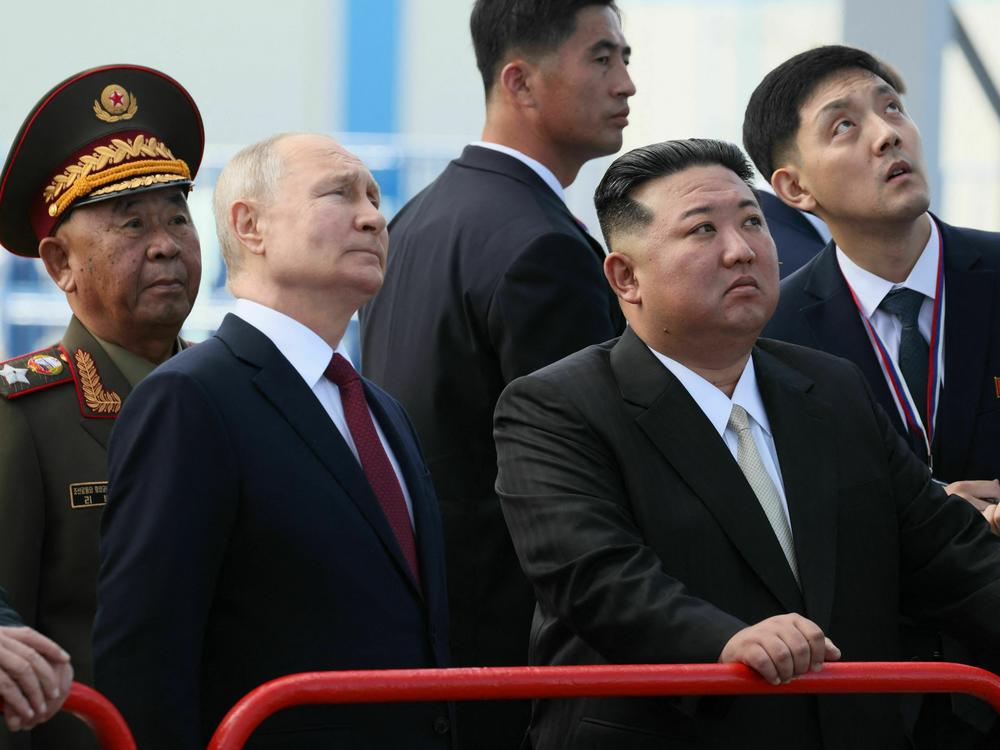Section Branding
Header Content
Kim Jong Un vows full support for Russia as Putin pledges space tech for North Korea
Primary Content
SEOUL, South Korea — North Korean leader Kim Jong Un promised his full support for Russian President Vladimir Putin in what he called a "fight against imperialism" in a summit in Russia, saying the countries' relations are a "top priority."
Putin offered North Korea technological assistance to launch a satellite into space and said there are "possibilities" for military cooperation between them.
The meeting, which lasted more than four hours Wednesday in Russia's Far East, showed how geopolitical tensions have brought the two neighbors isolated by the West into closer alignment. It comes as the United States has warned that Putin and Kim could strike an arms deal that would provide North Korean munitions for Russia's war in Ukraine.
South Korea's intelligence agency believes that Russia has already raised with North Korea the possibility of three-way naval exercises, including China.
Russia and North Korea can cooperate militarily "within the framework of the current rules," Putin told the Russia 1 TV network, after his talks with Kim and his delegation.
Kim traveled from North Korea by train, in his first trip abroad since the pandemic began and the North sealed its borders. The two last met in Russia in 2019.
Putin hosted Kim at the Vostochny Cosmodrome in Russia's Far East, where Russian space agency officials briefed Kim on their work.
Asked if Russia would help North Korea with its satellites, Putin was quoted by Russian media as saying that was why Vostochny was chosen as the venue for their meeting. North Korea failed twice this year to put a spy satellite in orbit, but says it will try again next month.
North Korea did, however, highlight advances in its weaponry, launching two short-range ballistic missiles just hours before the summit, the first time it has conducted such a test while Kim was out of the country.
There was no public mention at Wednesday's summit of Russia-North Korea cooperation on missiles. But both satellites and missiles rely on dual-use rocket technology, and the U.S. and its allies have argued that North Korea uses space programs as cover for weapons tests, in violation of United Nations Security Council resolutions.
Former South Korean Ambassador to Russia Wi Sung-lac says Moscow has traditionally been cautious about sharing sensitive military technologies with Pyongyang, and is not comfortable with North Korea's nuclear arsenal.
"They don't like it because Russia still commits to the cause of nuclear nonproliferation and missile nonproliferation," he says. "But still, they have another consideration, which is strategic and geopolitical."
And as the U.S. ramps up its military presence and alliances in Asia, Wi adds, Russia's considerations are increasingly driven by geopolitics.
Hong Min, a North Korea expert at the Korea Institute for National Unification, a government-funded think tank in Seoul, believes that Russia's perception of a U.S. threat on its eastern flank will cause it to drop previous inhibitions about helping Pyongyang.
"I believe the plan is for Russia to provide technical assistance in stages for North Korea's needs, such as reentry technology for ICBMs [intercontinental ballistic missiles], and advancement of hypersonic missiles and SLBMs [submarine-launched ballistic missiles]," Hong says.
In any event, Kremlin spokesman Dmitry Peskov told reporters the two neighbors' cooperation in sensitive areas should not be made public.
Putin said Kim would continue his visit to Russia following their talks, including a visit to the port city of Vladivostok, home to the headquarters of the Russian navy's Pacific fleet.
NPR's Se Eun Gong contributed to this report in Seoul.
Copyright 2023 NPR. To see more, visit https://www.npr.org.

